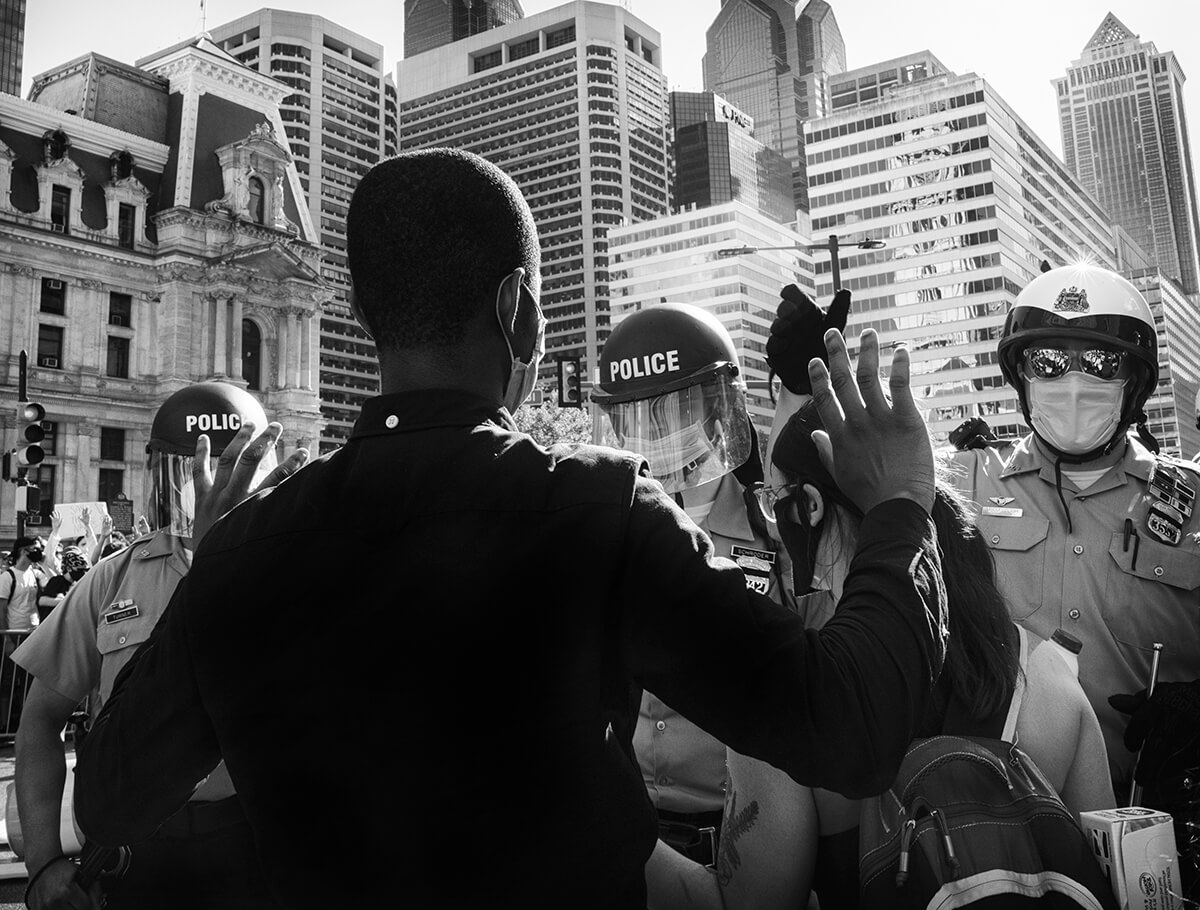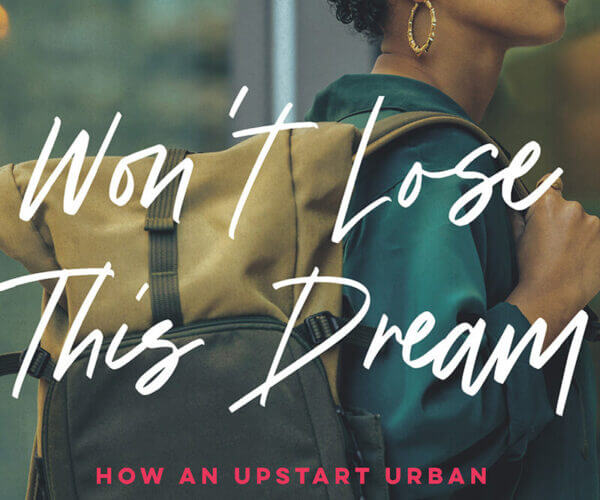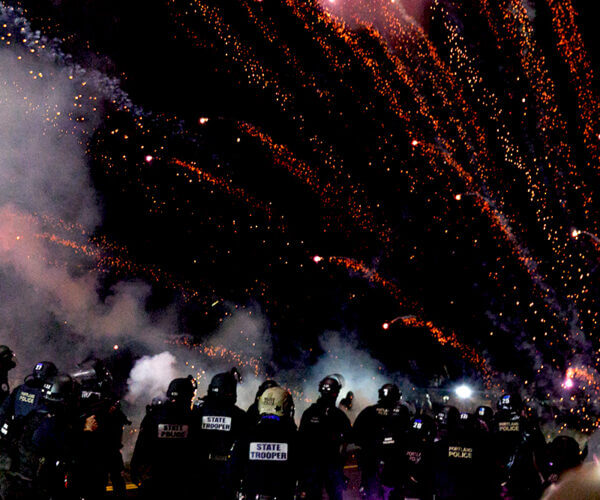Black Lives, Blue Matter
When I was a kid, I absorbed two lessons about cops: that they are here to help, and that they don’t help Black people.
The first one I learned through school and TV shows in a generic way — police help people, like doctors and school principals and cartoon superheroes help people. The second, I learned by living in South Central, and by listening to grownups around me talk about encounters with police both here in Los Angeles, where we lived, and in New Orleans, where my family came from. What I gathered from those conversations was that not only did police not help, their very presence was often a threat to us.
The most vivid stories were the ones my father told about Black people not being able to cross certain boundaries in L.A. in the ‘40s and ‘50s, when he was growing up, stories of police keeping the racial order via boundaries and curfews of “sundown towns” — an embedded, if unwritten, part of their job. This kind of policing was inescapable, I realized. Even if cops wanted to be the sober, judicious, ultimately helpful cops of school primers and television shows like “Dragnet” and “Adam-12,” it wasn’t that possible in the real world. White expectations for police to be agents of Black containment — the core reason for Black reticence about police — didn’t allow for it.
White America, even woke white America, can absorb more of this stuff, but Black people can’t. They won’t.
These expectations persist, which is why we have so many fatal shootings of Black people (shootings that happened before, during and now after the Derek Chauvin verdict). They are why the “few bad apples” theory of the fatal shootings looks so increasingly wrongheaded, a-historical and a-cultural. You’d have to say the inverse is true, that the good cops are the few good apples who seek to operate above the racialized American history that we’ve all absorbed, and that the policing profession absorbs in a very particular way, starting with slave patrols in the 19th century. Slave patrols started in the South to keep slaves on plantations and discourage them from running off and seeking freedom; they were the first beat cops.
And for the most part, white America has been fine with this arrangement, fine with the cops’ dim or wary view of Black people, because it’s understood that’s their job. It’s always been their job. It doesn’t mean that every officer enacts that dim view by shooting a black person unjustly; most of them don’t. But the expectation is that they might. And that if they do, we expect they will be largely forgiven, that their mistake or lack of judgment or outright intention to kill will be absorbed again and again by the country’s willingness to accept a certain amount of Black death (an amount that is evidently endless) as simply a consequence of keeping us all safe. It’s parallel to the deal countries strike with their people when it goes to war.
And yet these days I often think, wistfully, about how I was encouraged to believe that cops are basically helpful, because I still really want it to be true. Black people want it to be true. While there are some who want to abolish police, the vast majority of us just want good police and good policing.
A simple idea, a democratic idea. But it’s a radical ask, and the irony is that the more sympathetic white America becomes to the idea, the more radical the ask appears because we’re all starting to understand, together, just how deeply entrenched and how very much alive racism is, in our history and in so many of our institutions, beginning with, but not limited to, police. We are only starting to understand how much collective will is required to change it. And increasingly we know we can’t get there cop by cop. The change has to be big, broad and more or less instantaneous, because these killings simply can’t continue. White America, even woke white America, can absorb more of this stuff, but Black people can’t. They won’t.
***
My father died in 2020 just a week before George Floyd was murdered by Derek Chauvin. He was a lifelong racial justice activist on many fronts, but especially for police reform. This went back to the ‘60s, when he transitioned out of the county probation department and became a consultant for the L.A. County Human Relations Commission, an organization started after the Zoot Suit riots in the ‘40s and revived after the Watts unrest in ’65. The Watts event, like so many similar events in cities around the country that decade, was touched off by a police encounter with Black people that went bad. Of course, these kinds of encounters had been going badly for decades; people just accepted beatings or shootings or spurious arrests and detentions as part and parcel of Jim Crow and white supremacy in general. Nothing you could really do because, for one thing, Jim Crow was the law, and where it wasn’t the law — like in L.A. — it was a strong enough custom to have the same effect as law.
We cannot go back to taking steps. Instead, we have to demand every reform we want at once…
The ‘60s changed that — that is, Black responses to the same old shit started to change. This meant that the white responses had to change too, that white people could no longer expect Black deference or weary acceptance of the status quo that was a hallmark of Jim Crow. The change had to start in the streets, with police. For my dad, personally and professionally, this was where it all began. If Black people weren’t respected by police, if police didn’t fundamentally see Black lives as something to protect rather than violate, then all the education and job training and self-affirmation in the world acquired by Black people was going to be undermined, made a lie of. Americans were going to be exposed again and again as hypocrites, nonbelievers in their own creed of democracy and equal treatment.
It’s why my father devoted many of the thousands of columns he wrote for the L.A. Sentinel to the topic, why he helped found Community Call to Action and Accountability, formed after the fatal Los Angeles Police Department shooting of 13-year-old Devin Brown, a Black boy, in 2005. The bullets that killed him were fired through the back window of a stolen car he was driving. That was a long time ago, and it was yesterday: Adam Toledo, also 13, was shot and killed by police in Chicago in March after throwing a gun on the ground and putting up his hands in a final act of surrender.
Before the Civil Rights Movement, a cop shooting a Black person dead wasn’t routinely controversial or even newsworthy. Part of the mission of Black publications like the L.A. Sentinel was to report those incidents: Simply acknowledging what had happened to Black people was progress. These days there is at least acknowledgement and often controversy. What we tend to hear from officers who use deadly force on Black people is, “I didn’t mean to do it.” But don’t they?
While it’s hard to fathom that a veteran cop can’t tell his or her gun from a Taser, it isn’t hard to fathom how decades of seeing Black people as expendable really gave them permission to do it. This notion that it’s O.K. (if not actually preferable) to kill a Black person is built into the public’s expectation that cops do the job of keeping the social order. Many people are probably grateful: After all, the cops still do the dirty work of holding the thin white line that nobody likes to do openly anymore.
That’s true even given the phenomena of Trump Republicans embracing racism in open and appalling ways, like pushing voter suppression laws in every state where they can get away with it. But voting is occasional, and the laws around it closely watched; the police are on the ground everywhere, every day. They can’t be tracked or seen all the time. They are the flesh-and-blood membrane between Us and Them in the American body politic and in popular imagination. Many people, of all colors, still have a hard time seeing them any other way.
***
I’m one of those people. I mostly fear police, try to stay out of their way like I once strove to stay out of the way of bullies in middle school. I didn’t want any trouble, which I always expect if a cop driving behind me flashes his lights or, worse, warns me with a siren. Once, when I was parked in El Segundo, a cop pulled up almost next to me and sat. Didn’t get out of the car, just hovered. I had done nothing, but didn’t dare get out of the car, afraid I might trigger something.
Eventually he drove off, but slowly, with a certain reluctance. I thought, Clearly, I’m not supposed to be here. I was indignant, but also weirdly ashamed, like I’d been caught doing something bad that only the police officer could see. It’s like he saw the truth of me, confirmed the low life I really am, despite my loud insistence to the contrary in columns and other writings, despite the fact that I’m not a large, dark-skinned Black man with a spotty unemployment record, but a middle-aged Black woman of Creole descent, out on a daily walk with her dogs (OK, my unemployment is spotty too, but that’s the nature of freelance writing).
The sense of being suddenly, brutally exposed was exactly the feeling I had in 1973, when I was 11 years old and being bussed out my South Central neighborhood to a largely white elementary school a couple of miles south of El Segundo. It was late Friday afternoon and I had been refused entrance to a white classmate’s house because, she informed me almost without emotion, she “didn’t let niggers in her house.” It just wasn’t done. The white classmate, who I’d thought of as a friend, was policing me without a shred of remorse or regret; it was her job.
I accepted what she said, not because I agreed with it, but because I didn’t see any other choice. This girl had a weapon, the right to grant access, and I had nothing. In turning me away she had effectively arrested me for the crime of making the wrong assumptions about how white people like her saw me. That one moment undermined everything good about the school and my two years there, even the fact that I made other friends and got consistently good grades.
That moment of being completely denied just because was what my father was afraid of, the reason he fought so diligently for police accountability, that is, for Black humanity. He knew — though he never said it aloud — that without the presumption of Black humanity out there in force, amongst white communities and the police who served them, my particular gifts and good grades wouldn’t matter. Far from easing access or assimilation, they could make things worse.

At a march for Black lives in Portland, Oregon, in 2020. Photo by Josué Rivas
I live in Inglewood, close to where I grew up. Several years ago, my neighbors Larry and Christina sent several of their children to El Segundo High School for access to better opportunities and a level learning field Black parents have been chasing since Brown v. Board of Education overturned (but didn’t sufficiently undo) segregation in public schools back in 1954. El Segundo High wasn’t too happy about taking in any Black students and dragged its feet, but a state law ultimately left school officials there no choice. But as all Black people know, being in a white environment doesn’t mean being of it. Over the years, Larry told me that virtually every time he drove into El Segundo for a school event, he was stopped by police. Larry is tall, broad and dark-skinned. He has a bachelor’s in art from the University of Southern California and is working on his master’s, but this second fact is almost immaterial because of the first.
One of the most harrowing things about George Floyd’s murder was how reasonably he pled for his life.
One afternoon while he was sitting in his car waiting for school to let out, a white cop pulled up and demanded to know why he was there. “To pick up my kids,” Larry said. The cop didn’t buy it. He proceeded to question Larry and search his car; he asked him why he had photographic equipment in the trunk (one of Larry’s gigs is videography). Throughout this stop, Larry said, the cop had his hand on his gun. Larry was angry but kept cool because he knew what he was up against, knew what might happen. He knew the rules of the social order; the fact he was a parent of children who attended the school was irrelevant, both in the context of the stop and in American expectations.
Finally, when his sons came out to the car, he gestured to them, relieved. These are my sons, he said. The cop was unmoved. He asked, What are their names?
***
Recently, I read Rosa Brooks’ new book, Tangled Up in Blue, a memoir of how she, a law professor and staunch progressive, became a reserve police officer in D.C.’s Metro police department. As a story of an individual tackling something outside their wheelhouse, the book is absorbing, detailed, revealing and often funny in a surreal way.
It’s also predictable and troubling, in that Brooks ends up more or less liking the police. Not surprising; we tend to like and bond with the people we work with, even the assholes and malcontents. It’s a group thing. In becoming a cop, Brooks becomes part of the group. While the professor and progressive in her keeps referencing stats that describe structural problems, the cop she eventually becomes winds up tacitly embracing the “bad apple” theory, at least in the milieu of the Metro police. She does highlight some harrowing moments with fellow cops that illuminate those structural problems, but mostly she paints officers as first responders who, despite their crude language and lapses into cynicism, are performing a difficult, mostly dull, moderately dangerous, necessary and often thankless, but inherently heroic, job.
And really, how could it not look heroic to Brooks, who was probably expecting the worst and is relieved and then encouraged to find some decent folk showing up to work and making the best of things, like everybody else? During her training, Brooks admits to feeling caught between her two worlds, two selves — the law professor and the cop, the erudite progressive and the police officer who begins to exist, in a way, beyond politics. For Brooks, it is the cop who becomes the “real” person, the real human behind the job description, and the badge, that she was seeking in the beginning. Becoming a police officer doesn’t just educate her, it authenticates her. The idea that cops are the authentic people among us is seductive, even to people who know better. Especially to those people.
As the controversial shootings grind on in the (brief) glowing aftermath of the Derek Chauvin verdict — maybe because of them — I cling more resolutely than ever to that grade-school trope of police as inherently helpful. But it doesn’t feel hopelessly naïve anymore. It feels radically ideal. The silver lining of the political darkness of the past decade is that radical idealism has staged a comeback. Incrementalism, especially when it comes to slaying the dragon of racism that dictates so much in our lives, has been exposed as woefully inadequate to the times. We cannot go back to taking steps. Instead, we have to demand every reform we want at once — from defunding police to reimagining police altogether — and work back from there. Leading with high expectations is why we’re angry again and again, with each shooting: He/she wasn’t a helpful cop. But they should have been. That was their job. That’s always been their job. They just don’t do it enough.
Earlier this year I talked with a veteran white detective sergeant with the LAPD. It was the first in-depth conversation I’ve had with a cop in my life, and it was fascinating — and frustrating. Fascinating because the detective was disarmingly human, which I certainly didn’t expect (like Rosa Brooks didn’t expect). He readily owned up to many things: that police can be flawed and wrongheaded, that many are in the business for the wrong reasons, such as wanting to see action in mean streets. He owned up to racism as one of those reasons. He says the initial Black Lives Matter protests were positive, that people agitating for change is always positive because it’s empowering; his philosophy is that if you see something wrong, you’ve got to fix it, and there are certainly things wrong with police, including too little training that leads to errors. For his part, the detective sergeant says he always wants to model empathy, show less experienced officers how to be more human on the job in routine ways that matter most. Police work, he says, is all about siding with the little guy.
Yet when it came to calling the fatal shootings of Black people as police pattern and practice, or evidence of a wider malady in American culture made manifest in police, the detective stopped short. I realized after a time that no number of shootings and incidents I cited, no matter how egregious, was going to move him off the idea that bad cops are responsible for all the bad acts. I sensed that ratio didn’t matter: if it was 100 bad cops to 10 good ones, he saw that 10 as reason to downplay the 100. For him, the big picture didn’t change: Reform is always a straightforward matter of purging the bad elements, however prevalent, and building up the good ones. It’s math.
We weren’t arguing math so much as what the math means. But meaning is everything. The detective talked a lot about class and economic divisions informing police culture, but was reluctant to talk about racial divisions or race, period. I think it was partly because he was talking to a Black person, but more because he couldn’t bring himself to see himself, and his life work, as part of something structurally racist; that would be self-condemning, defeatist in a way many white people ultimately see race.
I understand his need for optimism as a strategy, particularly because he is a cop — he needs to believe, as I was once encouraged to believe, that cops are basically honorable or can be steered in that direction. But his optimism is rooted less in data than in a privilege I and other Black people don’t have, have never had. It is the privilege of choice: choosing not to believe in systemic police bias, even though the evidence for it is overwhelming and ongoing. His optimism comes at the price of truth, a price none of us can afford to pay anymore. This truth is writ large in the fact that virtually no police departments have reformed from within — only massive external pressure exerted by federal takeovers and oversight commissions and sustained protest, not internal incremental changes, make a dent.
The detective sergeant and I communicated fine but we were not on equal footing, and that troubled me, because we — a white cop and a Black citizen — needed to be. He seemed to think that we were agreeing to disagree, that talking rationally about things like structural racism is progress and even suggests a kind of equality.
But it doesn’t. Civility is not equality. It doesn’t even guarantee survival: One of the most harrowing things about George Floyd’s murder was how reasonably he pled for his life as Derek Chauvin was squeezing it out of him, one minute at a time. That’s the terrorism of racism. At critical moments it doesn’t listen to reason because that’s not what it’s made of. It doesn’t answer to anyone, least of all Black people. Real reform means that police have to start listening to something and someone else. Our country depends on it.
Help us sustain independent journalism...
Our team is working hard every day to bring you compelling, carefully-crafted pieces that shed light on the pressing issues of our time. We rely on caring supporters like you to help us sustain our mission. Your support ensures that we can continue to provide deeply-reported, independent, ad-free journalism without fear, favor or pandering. Support us today and make a lasting investment in the future.











